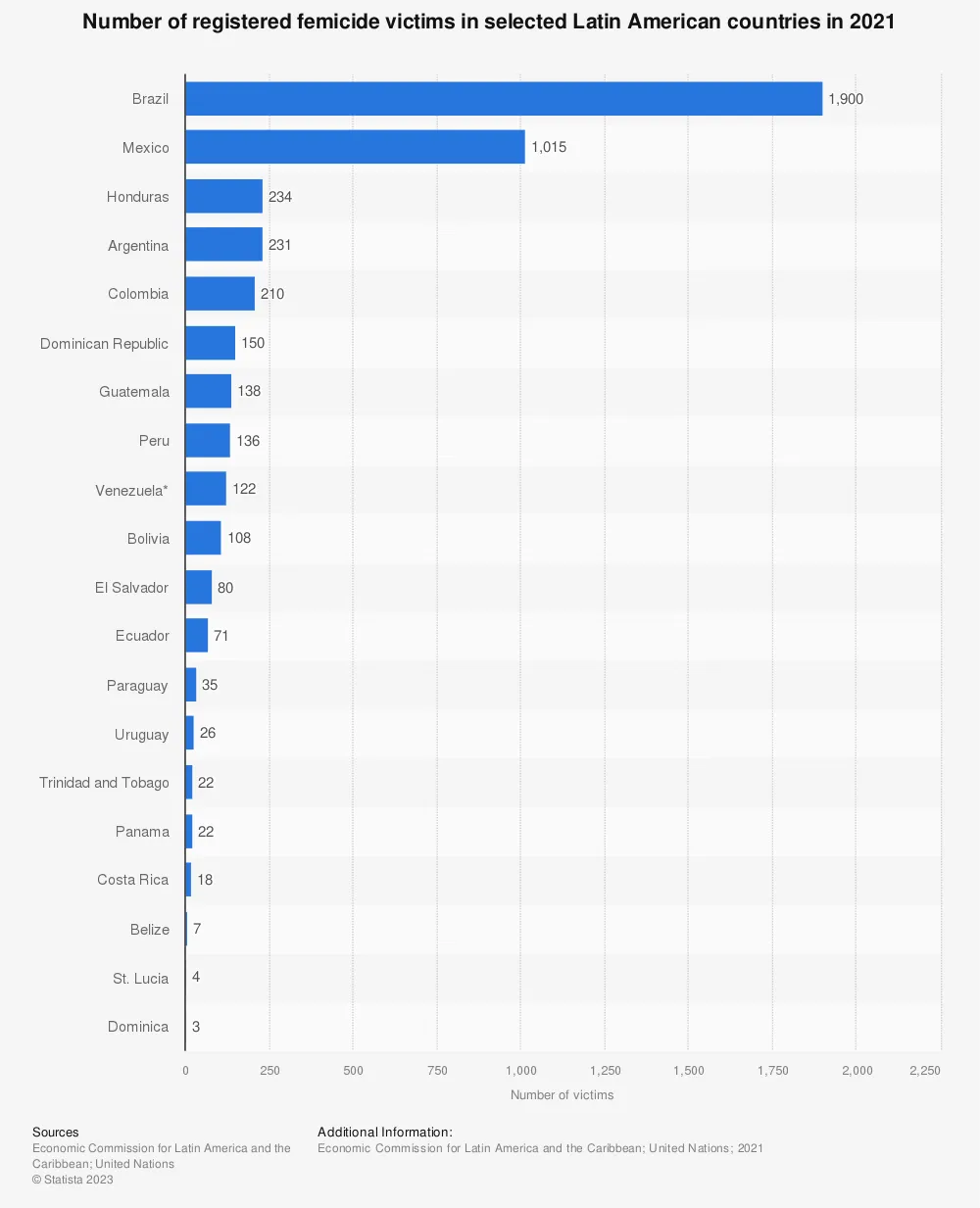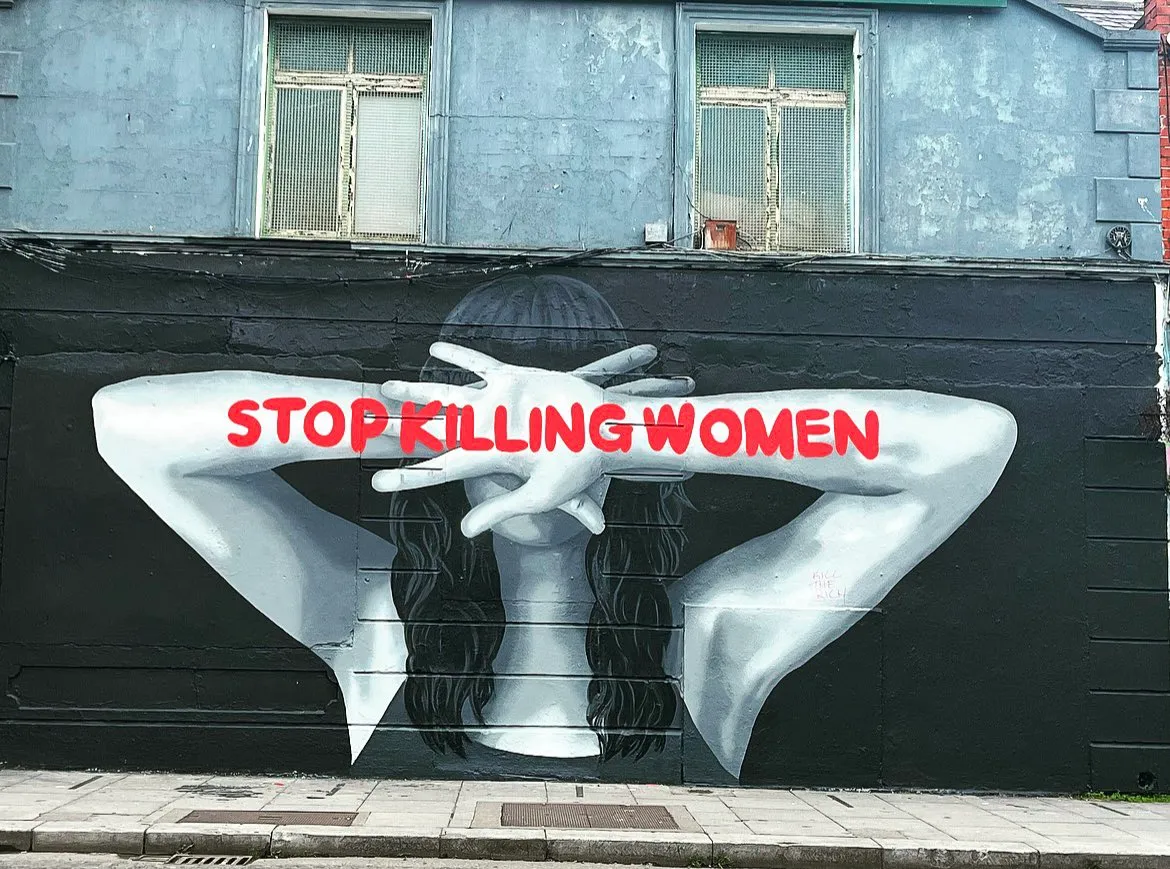
Edited with Canva.
Femicide in Latin America
This is a complex issue. From philosophy, legal science, or social perception, there is a long way to go to achieve a real consensus on the subject. I start from an unlimited rejection not only of the gender-based murder of a woman but of any attack on her dignity, from the slightest harm to her physical integrity to those practices that lacerate her psychological well-being. However, at the same time, I see some shortcomings both in the narrative and in the practices—social, and judicial—that seek to raise awareness and eradicate this scandalous scourge, which in 2021 took the precious lives of about 4,500 women in the region; in the same direction I also have my reservations with the feminist discourse, somewhat influenced, I concede, by the dissident version of Camille Paglia.

Source
Today I have reviewed a lot of information on this topic, and I have come across the dynamic that practically all publications—even scientific ones—that promise recipes against femicide focus on actions after its consummation, or end up being very sterile to achieve effective prevention. I was motivated to include the topic in today's report by reading this news from Colombia, where this year nearly 6,400 cases of gender violence have been reported, a figure that is far higher than all those known in 2022.
There, the Ombudsman's Office has presented a mobile application that would allow "reporting cases of gender violence in real time". I don't dispute the referred goal—who could?—, but looking at it from a logical and practical point of view, it isn't easy to achieve. That is, when a woman is in front of her aggressor, it is unlikely that she will have the opportunity to open her cell phone, look for the application, fill out a form, and send it to the relevant authorities. If physically she is at a disadvantage with her aggressor—as is usual—, sadly, her life or her integrity depends on him.

Source
The case of Cuba
According to reports from independent organizations, more than 70 femicides have occurred on the island this year. The Cuban government doesn't regularly report on the subject, so many times the information that appears in the media about potential cases contains many inaccuracies. Also, it comes from projects that pursue a political goal associated with its opposition to the current political regime. This way, approaching femicide ends up being a bridge to channel that opposition, not an end itself. Let us briefly review this publication from elTOQUE that discusses the Cuban legal system on the subject.
elTOQUE more or less says that Cuba is at the bottom of the class in Latin America when it comes to managing femicide within its legislation. In the narrative that elTOQUE advocates, the only way to get it right is to enact a specific law for this problem, or to include it within the criminal code. I tend to be more concerned about the content than the form. The question is how we make women less vulnerable, or stronger? It is true that in Latin America there has been an important legislative movement in recent years, but we can by no means say that it has been effective in resolving the situation of women's vulnerability.

Source
Costa Rica tends to be recognized as one of the exemplary countries in the region for its institutional solidity. However, despite having specific legislation covering the issue, the Inter-American Court of Human Rights has focused on the "judicial ineffectiveness in individual cases of violence against women". By the way, Costa Ricans understand femicide always linked to a man who has or has had a relationship with the victim, so we are talking about an extremely limited approach. In Brazil, which criminalizes it in its penal code, more than 1,400 cases were reported last year; in general, some 3,900 women died violently (yesterday President Lula da Silva sanctioned a law that protects the children of femicide victims up to the age of 18).
Paraguay is another of those democracies that are often extolled in Latin America. There they also have specific legislation, but this year it is very likely that the number of cases reported in 2022 will be exceeded. In August a man ran over his ex-partner several times despite the fact that he had a restraining order and was even under house arrest. Just ten days ago, a man shot his ex-partner—mother of his three children—to death when he was apparently under a judicial prohibition to approach her. Venezuela also has great debts on the subject, with all the exclusive legislation on the matter. In other words, the matter is more complicated than typifying a crime or making a law, although I don't deny that it is a very important step.

Women in the region weave networks to fight this scourge (source of the image).
However, Cuban legislation, although not as the editorialists of elTOQUE and other projects that work on this issue—using funding, at least indirectly, from the U.S. State Department—want, is not so far behind when one goes to its content (and the issue of explicit recognition of femicide is still an open debate in Europe, even in Spain, a country that has not criminalized it, as stated by elTOQUE). For example, in the Cuban Penal Code sanctioned in 2022, it's an aggravating circumstance of criminal responsibility to assassinate a person "for reasons of gender or family violence, discrimination based on sex, gender, sexual orientation, [or] gender identity". The legislation provides for life imprisonment or capital punishment for "whoever kills a woman as a result of gender-based violence".
Therefore, it does not seem that the Cuban legal system here is as naked as the TOQUE presents it. Last week, Cuban prosecutors requested life imprisonment for a man who murdered his ex-wife and her new partner. This last piece of information, by the way, serves to express that the Cuban dynamics regarding femicides are very similar to that of the world, where women die at the hands of men with whom they have or have had relations.
Your quick regional roundup
In Panamá, the legislative apparatus advanced yesterday in the approval of a bill which, among other points, includes the repeal of a law which enabled the signing of an agreement between the Government and a Canadian mining company—for the latter to exploit a humongous open-pit copper mine—which has had a representative part of the civil society protesting in the streets for more than ten days. The government had initially proposed only to veto future mining agreements, but this did little or nothing to calm an angry mass that has taken the issue as a matter of national pride. "If we see that the people do not agree, we will repeal that contract", said a legislator in the middle of the congressional debate, where there was also talking about the millionaire lawsuit to which the country could be exposed by the company. Today's protests were repressed with tear gas and rubber bullets.
Gabriel Boric, the Chilean president, traveled on Wednesday night to Washington to participate in the summit of the Americas Partnership for Economic Prosperity. There he plans to agree on investments while discussing issues such as workers' rights, the promotion of democracy, and environmental protection. The Israel/Hamas conflict may arise as well somehow. I think that for sure he will receive a reprimand from the owner of the Resolute desk for his commercial ties with China, a country with which he recently agreed important deals to develop the lithium industry. The United States does not hide its zeal for the slightest incursion by Beijing on this front, in a purely economic Monroe Doctrine.
As of September, Mexicans received just over US$47 billion in remittances, an all-time record for that period, and a 9.5% increase over 2022 (+ US$4 billion). The average value of remittances received is close to US$400. In September alone, Mexican emigrants—most of them located in the United States—sent a little over 5.6 billion dollars, in an upward trend that began after the outbreak of the COVID-19 pandemic. By the way, the amount leaving Mexico for the same concept is not minor either, with 916 million dollars "exported" also in the first three quarters of this year. According to President López Obrador, his country is only surpassed by India in the volume of remittances received, which at the same time represent 4% of the country's GDP and the second source of income, even above tourism and foreign direct investment.
And this is all for our one-hundred-tenth report. I have referenced the sources dynamically in the text, and remember you can learn how and where to follow the LATAM trail news by reading my work here. Have a nice day.

Edited with Canva.

